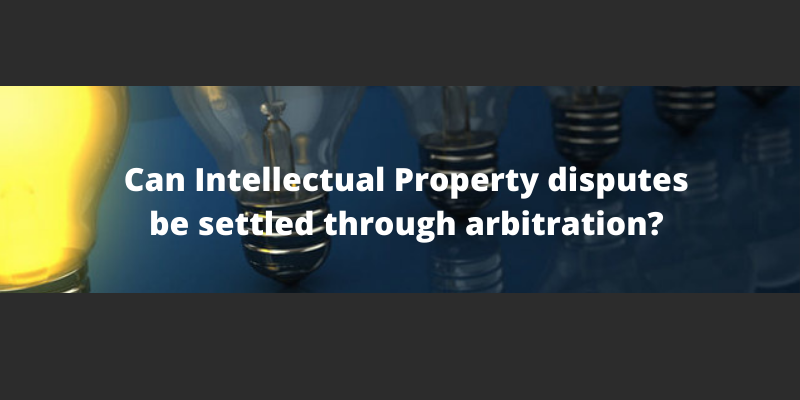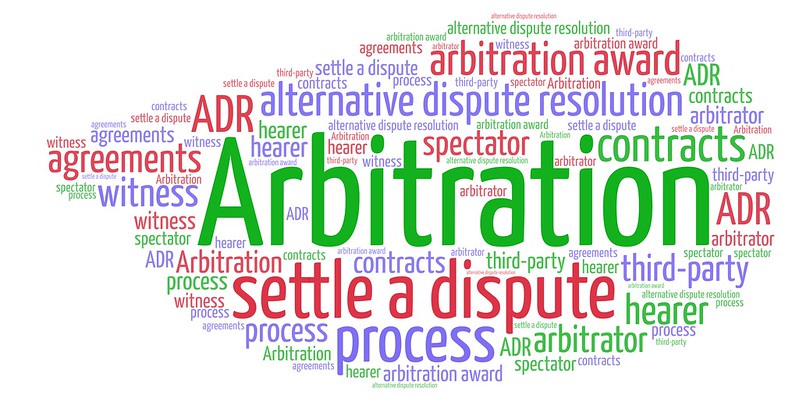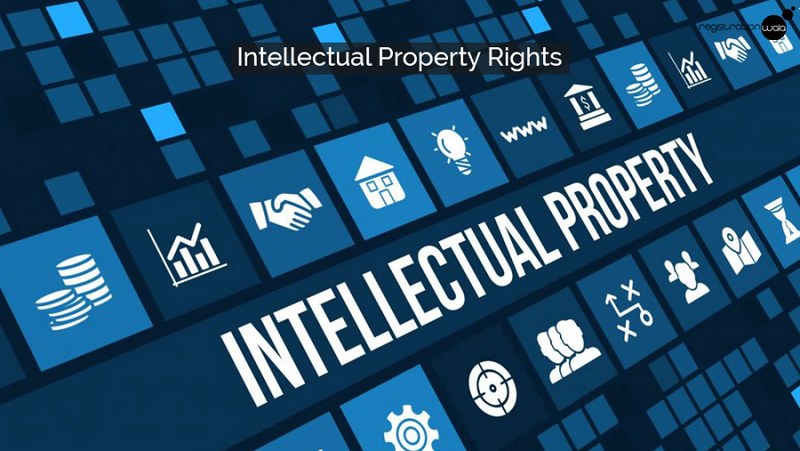Can Intellectual Property disputes be settled through arbitration?
11 Jan 2023
25 Apr 2022
min read

With the emergence of new technologies and the internet, the protection of intellectual property rights has only increased. Every business has a suite of intellectual properties which need to be protected. These include trademark subsisting in brand names, design rights in the structure and form of the products, copyright in the software, patents in the new inventions, etc. To know more about intellectual property, please refer to our guide and here.
One of the main methods of protecting intellectual property rights (IPR) includes preventing others from using it and enforcing the rights before a court of law. An alternative to action before the court is to settle such IPR disputes through alternative dispute resolution mechanisms such as arbitration. Please refer here to know more about arbitration.
Why arbitrate an IPR dispute?
1. Time and cost-effective
Arbitrations are known for being faster and more cost-effective. In common law jurisdictions where courts have a detailed discovery procedure, average litigation goes on for 2 to 3 years at the least. Therefore, shorter durations of arbitration, i.e. approximately 1-1.5 years, are more attractive. In an IPR dispute, arbitrations offer the benefit of finality with the passing of the arbitral award, as there is no endless procedure of appeals. In arbitration after the passing of the award, it can be enforced by the local courts. Shorter procedures inevitably imply cheaper processes, and therefore the cost of enforcement of the IPR comes down significantly.
2. Expert decision-makers
Since arbitration allows parties to appoint arbitrators of their choice, parties can appoint experts in the field of IPR to adjudicate their dispute. IPR, like patents, requires a deep understanding of the inventions involved and the technicalities for a valid patent as well. In such a case, experts are better suited to decide the matter. This is also more suitable than the jury system in some common law jurisdictions like the USA, where members of the public are made to decide the matter.
3. Confidentiality
Parties to arbitration, including the arbitrators, witnesses, experts, etc., are required to keep confidential all information in relation to the arbitration. The fact regarding the existence of the dispute and arbitration proceedings, the outcome thereof, information disclosed during arbitration, commercially sensitive information like IPR, trade secrets, and business know-how can be kept secret, through this requirement of confidentiality. General litigation procedures are normally open to the public. For this reason, arbitrations are a more attractive option in IPR disputes than litigation.
4. International Enforcement
The United Nations Convention on the Recognition and Enforcement of Foreign Arbitral Awards, 1958 (NY Convention) requires member states to recognise and enforce foreign arbitral awards. With 167 signatories, IPR dispute arbitral awards passed in the jurisdiction of any one member state can be enforced in any other member state with ease. This prevents a multinational company that has IPR registered in multiple jurisdictions from having to file suits in each of those jurisdictions in order to claim relief.

What to consider before arbitrating an IPR dispute?
Considering the aforementioned benefits, arbitration seems like the perfect solution. However, there are certain factors that have to be considered prior to initiate arbitration proceedings against the third party infringer or contractual party.
The first and most important is the existence of an arbitration agreement between the parties. Consent is the cornerstone of arbitration, and it is imperative that the parties have an arbitration agreement, prior to submitting the dispute to arbitration. This agreement must be in writing and can be a part of the IPR agreement executed between the parties, or a submission agreement can be executed with the infringing party after the arising of the dispute. The arbitration agreement lays down the method of the constitution of the tribunal, appointment of arbitrators, their jurisdiction and powers, the seat of arbitration, procedural law to be followed, the substantive law of the dispute, etc.
Intellectual property rights are conferred by states and hence are generally adjudicated by the state’s courts. The NY Convention allows for courts of a member state to refuse enforcement of an arbitral award if it concerns a subject matter which is not capable of being settled by arbitration. Some types of disputes which are not arbitrable generally include consumer matters, criminal matters, bankruptcy, etc. Therefore, prior to commencing arbitration, it is to be determined whether an IPR dispute is arbitrable in that state.
Recently some jurisdictions have begun permitting IPR disputes to be privately settled between parties through arbitration. However, most of these states protect their public policy by imposing additional restrictions and laying down that an IPR arbitral award is binding only amongst the parties to the dispute and is not enforceable against the world at large, as a judgement is. Therefore, if in a patent infringement case, the validity of a patent is reaffirmed, such positive reassurance through an arbitral award cannot be furnished as proof in subsequent proceedings, cannot be used to enforce the patent against a different party, or be used as a deterrent to future invalidity proceedings. Hence, if an IPR owner aims to set precedent and strengthen its IPR through a favourable validity judgement in its favour, it should not opt for arbitration and should file a suit before the court.

Which common law jurisdictions allow arbitration of an IPR dispute?
UK
None of the arbitration acts of the UK provides for arbitration of IPR disputes. The IPR statutes as well, do not recognise arbitrability of IPR disputes. However, the UK Patents Act, 1977 provides for arbitration of a dispute arising due to rejection of a compulsory license application, or Crown use of a patent. A UK court has also stayed in court proceedings in favour of arbitration in a dispute arising from a patent license agreement. However, these arbitration awards are only binding on the parties involved in the arbitration and are not enforceable against the whole world. Therefore, a foreign award in an IPR dispute is most likely to be recognised and enforced by UK courts under the NY Convention.
USA
The Patent Act of the USA expressly allows arbitration of patent disputes. However, the award is binding only between the parties and has no force on any other persons. Issues of validity of a patent could also be decided in arbitration, but again would only be effective amongst the parties to the dispute. Therefore, the patent owner would be able to assert the same patent against other parties.
The copyright statute does not expressly permit arbitration of copyright disputes. However, judicial decisions have allowed arbitration of copyright claims and claims under the Digital Millennium Copyright Act, including issues of copyright validity. Similarly, trademark disputes have also been arbitrated in the USA. Arbitrability of trade secret disputes has also been upheld by the US Courts of Appeals.
Canada
Canadian patent statutes do not expressly recognise arbitrability of patent disputes, and the Federal Court has exclusive authority to rule on the registration and validity of patents. However, case law has shown that arbitral awards concerning patents can be enforced amongst the parties to the arbitration and would not be recognised by the Patent Office of the Country.
Supreme Court of Canada has expressly recognised the validity of using arbitration to resolve disputes arising in respect of copyright and its related transactions. Canada’s Quebec’s Act which relates to the professional status of artists in visual arts, crafts, literature, etc., and their contracts with promoters, states that unless expressly renounced, dispute arising out of such contracts could be submitted to arbitration with the consent of the parties.
The Canadian Internet Registration Authority (CIRA) also provides a summary arbitration procedure to deal with bad faith “.ca” domain registrations, known as the CIRA Domain Name Dispute Resolution Policy (CDRP). A successful complaint in a CDRP dispute can result in the deletion of the registration or transfer of the domain name to the complainant. This evidences the general inclination in Canada to arbitrate even trademark-related disputes.
Australia
The general approach in Australia is that any dispute which can be determined by courts is also arbitrable. However, the Supreme Court has held that patent and trademark registration and validity claims are to be determined by the public authorities of the state only. Therefore, contractual disputes arising in relation to IPR could be arbitrated but would bind only the parties inter se and could not be enforced on the authorities or the public at large.
Singapore
Singapore’s Intellectual property (Dispute Resolution) Act, 2019 amended the Arbitration Act and the International Arbitration Act to specifically recognise and allow arbitration of IPR-related disputes. However, such arbitral awards only have an effect on the parties to the dispute. The Act encompasses the following IP disputes:
- Disputes over the enforceability, infringement, subsistence, validity, ownership, scope, duration, or any other aspects of IPR;
- Disputes over transactions with respect to IPR;
- Disputes over any other compensation payable for an IPR.
Hong Kong
The Hong Kong Arbitration (Amendment) Ordinance, 2017 clarifies that disputes in relation to IPR are arbitrable and can be enforced inter se the parties to the dispute. The language in this Ordinance is very similar to Singapore’s IP (Dispute Resolution) Act, 2019, and hence it includes the following IP-related disputes as arbitrable:
- Disputes over the enforceability, infringement, subsistence, validity, ownership, scope, duration, or any other aspects of IPR;
- Disputes over transactions with respect to IPR;
- Disputes over any other compensation payable for an IPR.
The Ordinance even allows for patent validity issues to be arbitrated.
Conclusion
In summary, the trend in common law jurisdictions is to allow arbitration of IPR disputes, however, the awards are only enforceable amongst the parties to the dispute and cannot be enforced against third parties. Therefore, an award declaring a trademark to be invalid would not mean that the trademark owner cannot continue to use or enforce the trademark against other parties. The award would only preclude the owner from enforcing such an award against the opposite party to the dispute.
Keywords:

